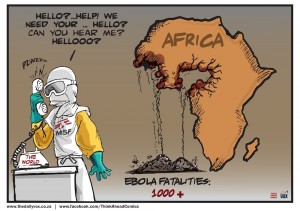Aid agency Doctors Without Borders (MSF) has sounded alarm bells at the UN headquarters in new York on Tuesday, warning that the Ebola virus will spread unless there is a “massive deployment” and calling on states with “biological-disaster response capacity” to send aid and personnel to West Africa urgently.
“Six months into the worst Ebola epidemic in history, the world is losing the battle to contain it,†said MSF International president Dr Joanne Liu. “Leaders are failing to come to grips with this transnational threat.”
The epidemic, which gained international notice in March, has infected over 3,000 people claimed more than 1,550 lives. At least 150 medical workers have died from Ebola so far. It is now recognized as the worst Ebola epidemic the world has ever seen.
MSF has implored the international community to send aid and help
- scale up field hospitals with isolation wards,
- dispatch trained personnel to affected areas,
- deploy mobile laboratories,
- establish air bridges to move personnel and material, and
- establish a regional network of field hospitals to treat medical personnel with suspected or actual infections.
“The clock is ticking and Ebola is winning,†said Liu. “The time for meetings and planning is over. It is now time to act. Every day of inaction means more deaths and the slow collapse of societies.â€
Also speaking at the UN was Thomas Frieden, director of the US Centers for Disease Control and Prevention, who said he “could not possibly overstate the need for an emergency responseâ€.
“There is a window of opportunity to tamp this down, but that window is closing. … We need action now,” said Frieden, who described the outbreak as “a problem for the worldâ€, not just for Africa.
Meanwhile the UN’s Food and Agricultural Organisation has warned that a lack of labour in the affected countries could lead to food shortages in the coming months. Food prices in West Africa are reported to be soaring.
According to the FAO, the price of cassava, a staple food, rose 150% at a market in the Liberian capital Monrovia, in the first weeks of August; currency depreciation Liberia is expected to drive prices up further. Plans are underway to increase food aid to the region in the coming months.
Researchers are now focusing on finding a vaccine against Ebola. One drug trial involving 20 healthy adult volunteers at the National Institutes of Health (NIH) in Maryland was brought forward in light of the outbreak.
Dr Anthony Fauci, director of the National Institute of Allergy and Infectious Diseases, said there was “an urgent need†for a protective vaccine.
A separate experimental drug, ZMapp was offered to seven health workers infected with Ebola last month. Two of the health workers died despite receiving the drug, and its unclear whether the drug helped the others recover.

![Healthcare workers in PPE [msf] [sylvain cherkaoui] [resized]](https://www.thedailyvox.co.za/wp-content/uploads/2014/08/Healthcare-workers-in-PPE-msf-sylvain-cherkaoui-resized.jpg)








